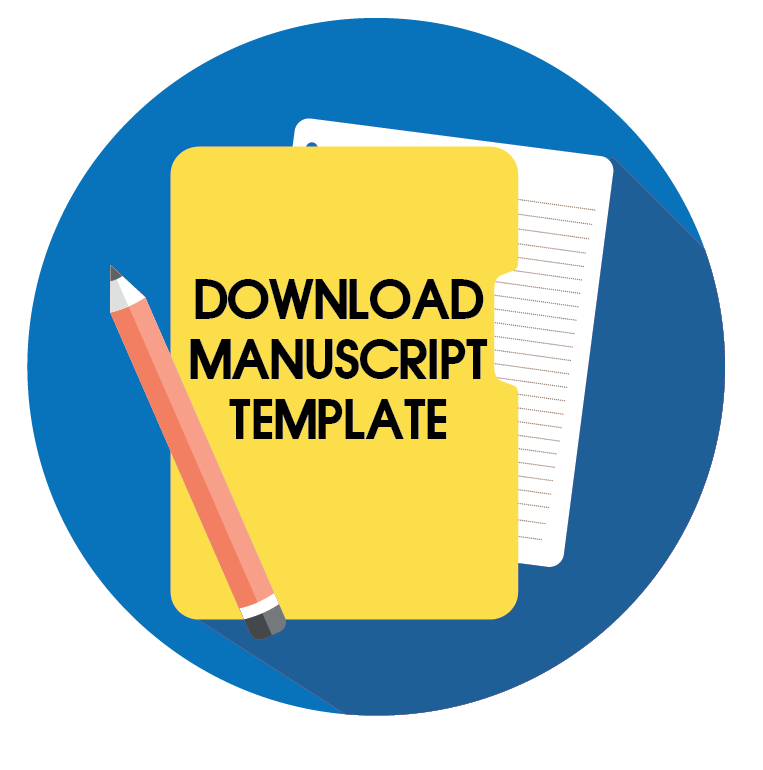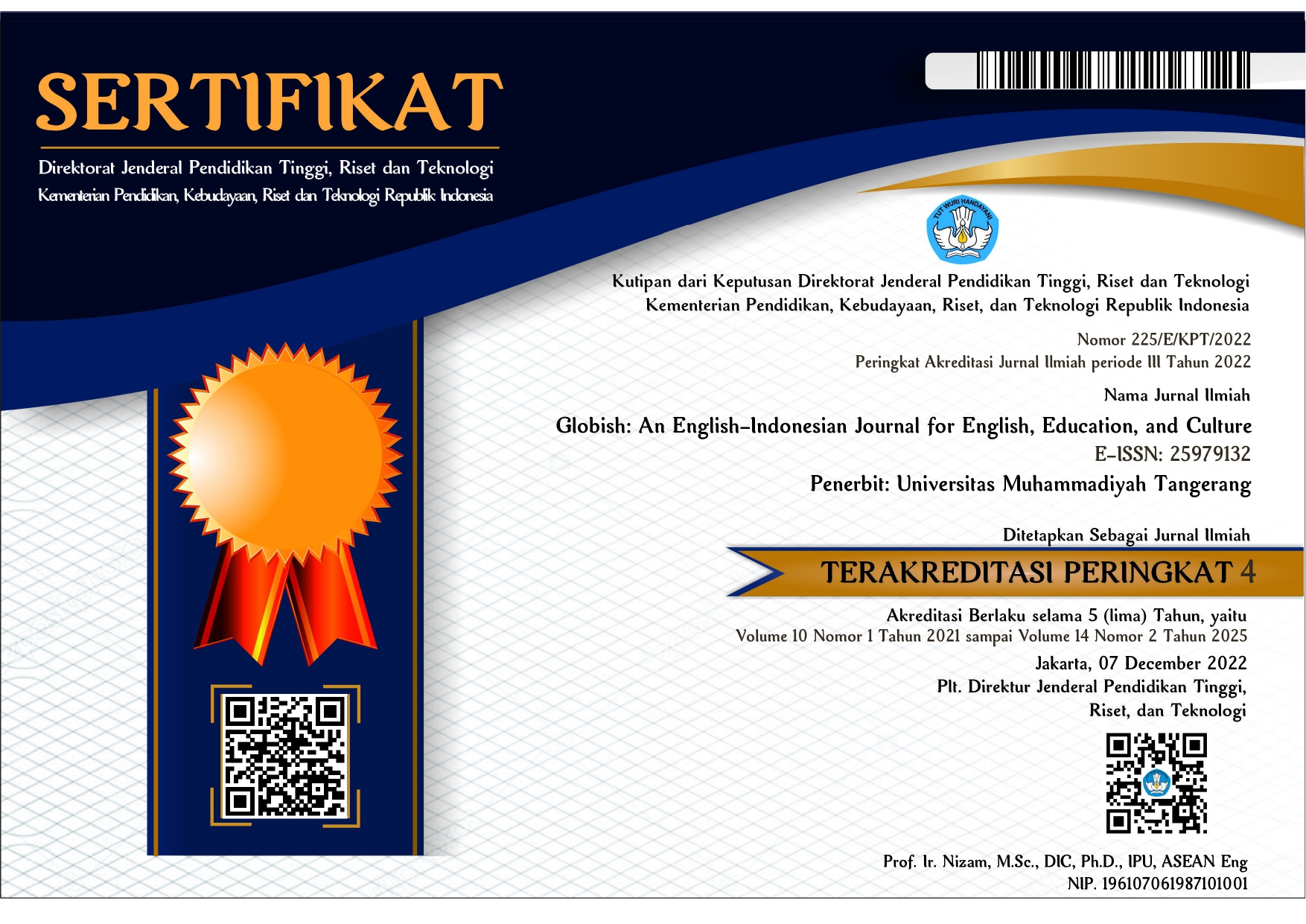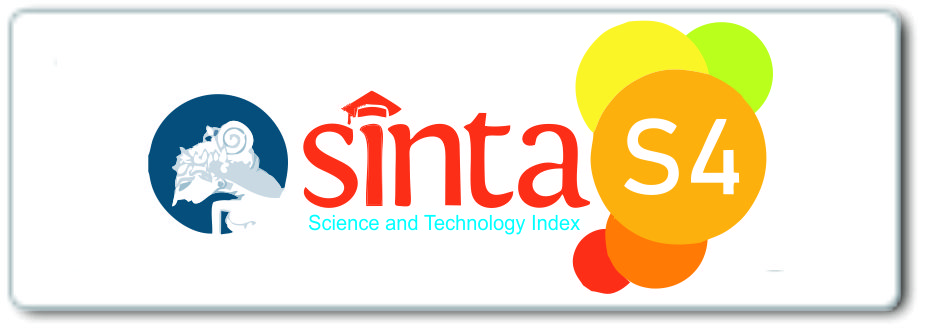Group Investigation Technique on Indonesian High School Students’ Writing Skill
Abstract
Writing is the work of pouring ideas, expressing those ideas, and organizing them into statements and paragraphs that will be clear to a reader. Five points that students need to pay attention to in writing are content, organization, vocabulary, language use (grammar) and mechanic. Therefore, in this research, the researcher choosed Group Investigation Technique in teaching writing skill. The objective of this research is to discover whether any significant effect or not in the implementation of Group Investigation Technique on Indonesian high school students’ writing skill because the students were not familiar with the written form in English in spite of they have some assignments about that. Some students were not confident to write in English because they were afraid to make mistake in grammar. The researcher used Quantitative approach and Quasi Experiment method with Non–Equivalent Control Group Design. Both of experimental class and controlled class consist of 38 students as the sample of this research. The result of this research is shown the mean score of controlled class (X.FI.1) pretest (58,5) is a little smaller than experimental class (X.FKK.2) pretest (60,26). Meanwhile the mean score of controlled class postest (65,82) is way smaller than experimental class postest (73,4). Based on the data analysis postest of hypotheses testing with significant level 5% (0,05), the result obtained that tcount (3,18) > ttable (1,99) where the statistical hypotheses of H0 was rejected and H1 was accepted. So, it can be concluded that there is significant effect in the implementation of Group Investigation Technique on Indonesian High School Students’ Writing Skill.
Keywords
Full Text:
PDFReferences
Achmad et al. (2018). Application of Group Investigation (GI) Learning Model in Pendidikan IPS SD Course, To Improve Students’ Critical Thinking Skills At Pgsd Universitas Negeri Makassar. IOSR Journal of Research & Method in Education (IOSR-JRME), 42-43.
Asyik & Putri. (2016). Using The Group Investigation Technique in Teaching Reading Comprehension. ENGLISH EDUCATION JOURNAL (EEJ),, 1-15.
Brown & Dowling. (1998). Doing Research/Reading Research: A mode of Interrogation for Education. London: The Falmer Press.
Brown, H. (2004). Language Assessment Principle and Classroom Pratices. Longman.
Chrystal, D. (2003). English As Global Language. New York: Cambridge University Press.
Efendi, Y. (2017). The Influence of Using Small Group Discussion Towards Students' Descriptive Text Writing Ability at The First Semester of The Tenth Grade of SMA Hidayatul Muslihin Way Kanan in The Academic Year of 2016/2017. Lampung: State Islamic University Raden Intan.
Harmer, J. (2004). How to Teach Writing. Harlow: Longman.
Iswardati. (2016). The Implementation of Group Investigation to Improve the Students’ Speaking Skill. Dinamika Ilmu, 245-261.
Johnson. (1987). Approaches to Research in Second Language Learning. London: Longman Group Ltd.
Lodico et al. (2006). Methods In Educational Research From Theory To Practice. San Fransisco: Jossey-Bass.
Nunan, D. (2003). PRACTICAL ENGLISH LANGUAGE TEACHING. Singapore: Mc Graw Hill.
Oshima, A., & Hogue, A. (2006). Writing Academic English (4th ed). USA: Pearson Longman.
Riadi, D. (2014). Metode Statistika Parametrik & Nonparametrik. Tangerang: PT Pustaka Mandiri.
Rohim, A. (2017). Essay Writing: How To Write An Essay. Yogyakarta: Penerbit Deepublish (CV BUDI UTAMA).
Sharan, & Sharan. (1992). Expanding cooperative learning through group investigation. New York: Teachers College Press.
Stephanie A.Miller. (2011) Journal Using Graphic Organizers To Increase Writing Performance. (230-235)
Sugiono. (2010). Metode Penelitian Pendidikan. Alfabeta:Bandung
Sugiyono. (2010). Statistika Untuk Penelitian. Bandung: Alfabeta.
Weigle S.C. (2009). Assessing Writing. Cambridge University Press
DOI: http://dx.doi.org/10.31000/globish.v9i1.2333
Article Metrics
Abstract - 817 PDF - 303Refbacks
- There are currently no refbacks.
Globish
Program Studi Pendidikan Bahasa Inggris
Fakultas Keguruan dan Ilmu Pendidikan
Universitas Muhammadiyah Tangerang
Jl. Perintis Kemerdekaan I/33, Cikokol
Kota Tangerang, Indonesia
e-mail: globish_journal@umt.ac.id
Globish (p-ISSN: 2301-9913 | e-ISSN: 2301-9913) is licensed under a Creative Commons Attribution-ShareAlike 4.0 International License.









